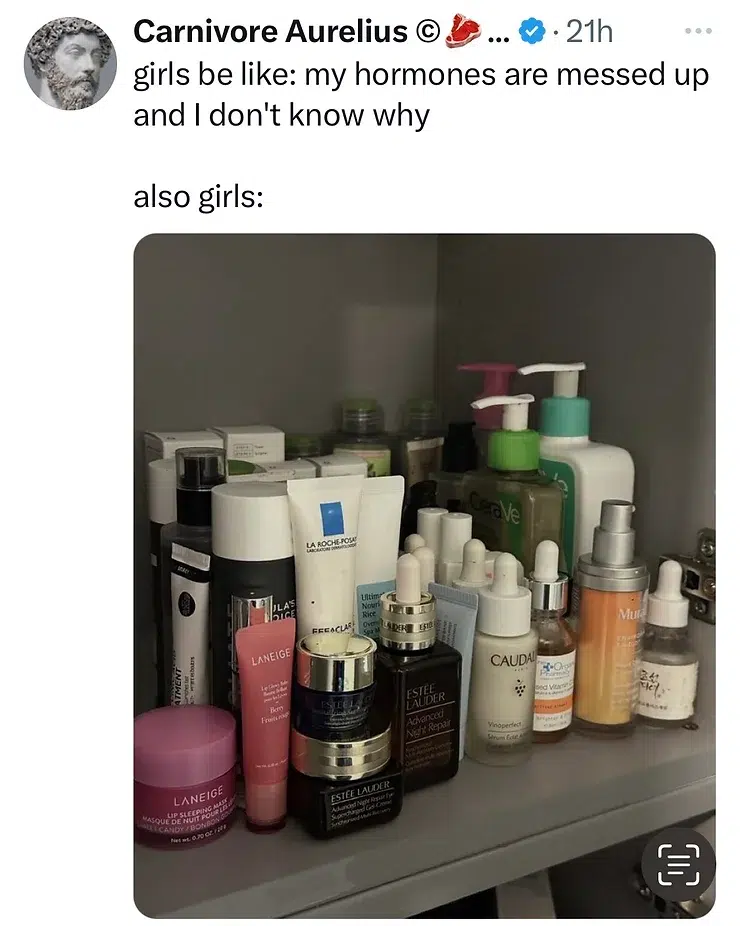What do I put on my body?
This week I went out to a lecture in the evening, during the evening I met an acquaintance I hadn’t seen in a long time and she immediately hugged me
Her scent hit me quickly – a scent I couldn’t contain..
Bad smell? Depends on who you ask
It was the scent of a synthetic substance that we learned to call perfume.
Perfume is a general name for any liquid that emits a pleasant smell.
Perfume is produced from some natural source (plants) or is produced completely synthetically, in her case it was completely synthetic.

What made this hug difficult was that her scent stuck to me immediately. You know that? That after hugging someone, you stay with their scent for hours?
It created an unpleasant feeling in my body and after a few minutes I went to the bathroom to wash it off,
I don’t act like that for no reason.
The reason her scent stuck to me is because most synthetic perfumes today contain ingredients designed to do exactly that. “stick” the substance to our bodies.
What ingredients am I talking about? It’s complicated..
The easiest way to know what’s inside a product we use would be to read the ingredients list.
In the case of perfumes, due to laws designed to protect perfume manufacturers from sharing “trade secrets”, most commercially sold perfumes are loaded with harmful chemicals that are not listed individually on the ingredients label.
Instead, these deadly chemicals are simply covered up under the term “fragrance”—a blanket term that can refer to a variety of different ingredients.
Phthalates are one of the most studied and widely reviewed chemicals found in perfumes.
Let’s take a closer look at this chemical.
Phthalates are a group of man-made chemicals that were developed over the past century for use in the plastics, solvents, and personal care industries. They are used to soften and soften plastics and are used in a wide variety of products, including health products and fragrances.
Phthalates are hormone disruptors.
What disrupts our hormones?
Phthalates are known as endocrine disruptors, meaning they disrupt our hormonal balance and can cause serious health problems.
Phthalates, found in perfumes, can enter the human body through the skin or when inhaled.
Researchers have found that these chemicals are persistent and Remain in the body and accumulate very slowly in fatty tissues, which in the future may cause serious and long-term chronic diseases.
Phthalates are easily released into the environment because there is no chemical bond between them and the substance with which they are mixed.
Most of our exposure to this substance is caused by consuming food packaged in plastic, breathing it in, and through skin contact.
In biological monitoring surveys (monitoring of blood, urine, or other body fluids) in a representative sample of the general population in the United States, metabolites (breakdown products) of various types of phthalates were found in the urine of over 95% of the subjects. The findings of a biological monitoring survey of 250 adults in Israel, conducted by the Ministry of Health, were recently published.
The findings show that concentrations of 10 out of 11 types of phthalate metabolites were found in over 98% of the people in the sample, and all 11 metabolites tested were found in 92%.
Phthalates can be found in a wide variety of products:
Personal care and cosmetics
Perfume
Shampoo
“Protective” cream
Nail polish
Sanitary pads
Hair spray
Eye shadow
Liquid soap
Moisturizer
Cleaning products
Milk and condiment packaging
Fast food
Processed food packaging
Pesticides

The real effects
According to studies, exposure to phthalates affects the reproductive system and causes health effects such as: disruption of the development of the male reproductive system, disruption of the natural function of the hormonal system, the appearance of birth defects in the reproductive system and genitals, lower testosterone levels during puberty, early puberty in females, low sperm count in adults, low birth weight and premature birth.
In the last decade, studies have begun to be published that everyone should be aware of.
It was published in a study that phthalates are substances that may be carcinogenic to humans. Especially in organs with many estrogen receptors such as
breast cancer.
A February 21 study in the journal AJPH from the TENDR project concluded that exposure to ortho-phthalates may impair brain development, and increase children’s risk of learning disabilities, attention deficit hyperactivity disorder (including hyperactivity, aggression/defiant behavior, and emotional reactivity).
It was found that phthalates may affect sexual development in humans and affect both male fertility/testosterone levels and female fertility/uterine fibroids.
In an Israeli study published in the June 21 edition of the journal Human Reproduction, researchers attempted to understand exactly how phthalates affect female fertility. The study is an international collaboration of researchers from Sheba Medical Center, the Ruppin Academic Center, and Harvard and Columbia Universities in the US.
Microbiome, Phthalates, and Perfluorinated Organic Substances (PFAS).
There is initial evidence that exposure to phthalates may also affect brain development in humans.
The populations most susceptible to phthalate exposure are pregnant women, infants and children under the age of 3, and chronically ill patients.
A January 2020 study published in the medical journal Environment International found that exposure to phthalates during pregnancy puts the newborn at increased risk of fine motor problems (fine motor scores).
Researchers from the University of Illinois are tracking the effects of hormone-disrupting chemicals (PFAS) on the physical and behavioral development of children from birth to childhood. They published an article in the May 21 edition of the journal Neurotoxicology. They found evidence linking pregnant women’s exposure to phthalates to altered cognitive outcomes in their babies. Prenatal phthalate exposure has been linked to slower information processing and may impair recognition abilities related to prior memory.
In a study published July 22 in the journal JAMA Pediatrics, researchers examined the link between phthalates and preterm birth. The data was pooled from 16 studies conducted across the United States. The researchers found that women with higher concentrations of several phthalate metabolites in their urine were more likely to deliver their babies prematurely, meaning they were born three or more weeks before their due date.
Exposure to four of the 11 phthalates found in pregnant women was associated with a 14-16 percent higher chance of giving birth prematurely. The most consistent findings were for exposure to a phthalate commonly used in personal care products such as nail polish and cosmetics.
We woke up, what do we do?
Before we talk about solutions, let’s talk about the idea of perfumeing ourselves.
What do we do? Give up perfume? What if I allow myself to bring my true, biological scent?
In episode 64 of the podcast, I spoke with Prof. Gurit Birnbaum about how to attract the right person for me. We talked about the importance of our scent in finding the right person for us, meaning that the more we try to hide/change our scent, the less likely we are to find the right person for us. I personally like to smell people’s natural scents. This doesn’t mean I don’t wear deodorant or suggest not wearing deodorant, but there is a significant difference between preventing unpleasant body odors and covering up with a new scent.
Natural scent
I’m not a hippie, but in most cases when there is a person around me and he smells strongly of perfume – it repels me. I hear this from both men and women about men. It’s one of those things that only when you stop using it do you notice how significant they are.
As with any other consumer product, we were convinced to use it because we were told about our insecurities.
We were born with a natural scent and we don’t need help if it’s not from nature.
I know that changes are not easy, and there are things that everyone does, but maybe it’s time to start paying attention to every product we use. Certainly if we apply it to our skin, to our body, no matter how much it’s marketed to us in beautiful packaging and promises.
There is no shortage of products on the market that are free of industrial materials and they are still amazing. I use natural deodorant, natural soap, the cleaning products in my house are made from natural materials, even the laundry. If I were to use sunscreen, it would also be natural and there are some from natural materials in the shops.
You can get everything in health food stores, online and on iherb.
And most importantly –
Read ingredient lists!































